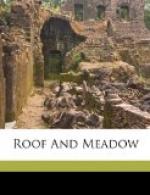As I dipped along, my head was enveloped in the cloud; but bending over the skiff, I could see far up the stream between a mist-ceiling and a water-floor, as through a long, low room. How deep and dark seemed the water! And the trees how remote, aerial, and floating! as if growing in the skies, with no roots’ fast hold of the earth. Filling the valley, conforming to every bend and stretch of the creek, lay the breath of the water, motionless and sheeted, a spirit stream, hovering over the sluggish current a moment, before it should float upward and melt away. It was cold, too, as a wraith might be, colder than the water, for the June sun had not yet risen over the swamp.
At the bridge where the road crossed was a dam which backed the creek out into an acre or more of pond. Not a particle of mud discolored the water; but it was dark, and as it came tumbling, foaming over the moss-edged gates it lighted up a rich amber color, the color of strong tea. In the half chill of the dawn the old bridge lay veiled in smoking spray, in a thin, rising vapor of spicy odors, clean, medicinal odors, as of the brewing of many roots, the fragrance of shores of sedges, ferns, and aromatic herbs steeped in the slow, soft tide. And faint across the creek, the road, and the fields lay the pondy smell of spatter-docks.
I pushed out from the sandy cove and lay with a reach of the lusty docks between me and either shore. It was early morning. The yellow, dew-laid road down which I came still slumbered undisturbed; the village cows had not been milked, and the pasture slope, rounding with a feminine grace of curve and form, lay asleep, with its sedgy fingers trailing in the water; even the locomotive in the little terminal round-house over the hill was not awake and wheezing. But the creek people were stirring—except the frogs. They were growing sleepy. The long June night they had improved, soberly, philosophically; and now, seeing nothing worth while in the dawn of this wonder day, they had begun to doze. But the birds were alive, full of the crisp June morning, of its overflow of gladness, and were telling their joy in chorus up and down both banks of the creek.
Hearkneth thise blisful briddes how they singe.
Do you mean out in Finsbury Moor, Father Chaucer? They were sweet along the banks of the Walbrook, I know, for among them “maken melodye” were the skylark, ethereal minstrel! and the nightingale. But, Father Chaucer, you should have heard the wood-thrushes, the orchard-orioles—this whole morning chorus singing along the creek! No one may know how blissful, how wide, how thrilling the singing of birds can be unless he has listened when the summer mists are rising over Racoon Creek.
There is no song-hour after sun rise to compare with this for spirit and volume of sound. The difference between the singing in the dusk and in the dawn is the difference between the slow, sweet melody of a dirge and the triumphant, full-voiced peal of a wedding march. Even one who has always lived in the country can scarcely believe his ears the first time he is afield in June at the birds’ awaking-hour.




